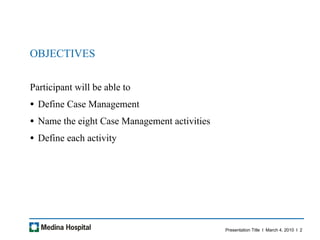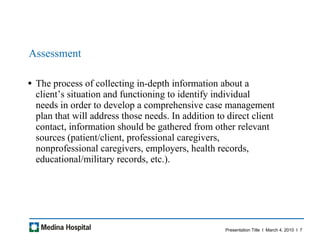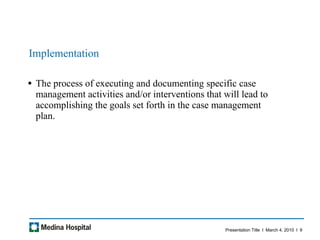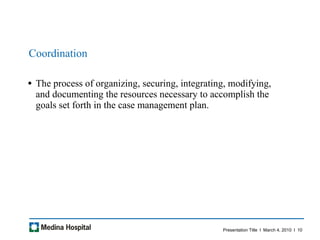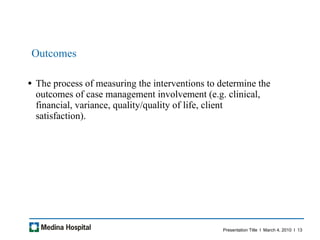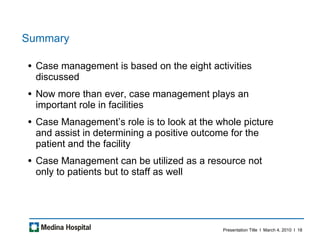Case Managment 101
- 1. Case Management 101
- 2. Participant will be able to Define Case Management Name the eight Case Management activities Define each activity OBJECTIVES
- 3. Definition Case Management is a collaborative process that assesses, plans, implements, coordinates, monitors, and evaluates the options and services required to meet the client's health and human service needs. It is characterized by advocacy, communication, and resource management and promotes quality and cost-effective interventions and outcomes.
- 4. C A S E I M A N A G E M E N T Case management is an area of specialty practice within the health and human services profession. Its underlying premise is that everyone benefits when clients reach their optimum level of wellness, self-management, and functional capability
- 5. Philosophy Case management facilitates the achievement of client wellness and autonomy through advocacy, assessment, planning, communication, education, resource management, and service facilitation.
- 6. The Eight Case Management Activities Assessment Planning Implementation Coordination Monitoring Evaluation Outcomes General
- 7. Assessment The process of collecting in-depth information about a client’s situation and functioning to identify individual needs in order to develop a comprehensive case management plan that will address those needs. In addition to direct client contact, information should be gathered from other relevant sources (patient/client, professional caregivers, nonprofessional caregivers, employers, health records, educational/military records, etc.).
- 8. Planning The process of determining and documenting specific objectives, goals, and actions designed to meet the client’s needs as identified through the assessment process. The plan should be action-oriented and time-specific.
- 9. Implementation The process of executing and documenting specific case management activities and/or interventions that will lead to accomplishing the goals set forth in the case management plan.
- 10. Coordination The process of organizing, securing, integrating, modifying, and documenting the resources necessary to accomplish the goals set forth in the case management plan.
- 11. Monitoring The ongoing process of gathering sufficient information from all relevant sources and its documentation regarding the case management plan and its activities and/or services to enable the case manager to determine the plan’s effectiveness.
- 12. Evaluation The process, repeated at appropriate intervals, of determining and documenting the case management plan’s effectiveness in reaching desired outcomes and goals. This might lead to a modification or change in the case management plan in its entirety or in any of its component parts.
- 13. Outcomes The process of measuring the interventions to determine the outcomes of case management involvement (e.g. clinical, financial, variance, quality/quality of life, client satisfaction).
- 14. General The activities/interventions that are performed across case management practice and process (e.g. maintaining client's privacy, confidentiality and safety, advocacy, adherence to ethical, legal and accreditation/regulatory standards
- 15. Case Management at Medina Hospital Discharge planning – this includes assessing patient for the appropriate alternative care setting and coordinating with patient and family needs Discharge planning starts on admission. The discharge plan is based on the patients needs at that time. Delay in discharge planning not only puts the facility at fiscal risk, but also puts the patient at risk. The longer the patient stays, the risk of noscomial complications increases.
- 16. Medina Hospital Care Managers Utilization review – reviewing charts for medical necessity and for payment Private payers as well as Medicare/Medicaid are now starting to review charts for medical necessity. Documentation in the chart must support hospitalization. 40% of funds returned to RAC were due to the patient NOT meeting medical necessity. Private payers also audit patient charges. IF documentation does not support those charges, we can be liable to return funds.
- 17. UR continued All observation charts are audited for medical necessity and for actual observation time. The results of this audit are dependant on how well the documentation in the chart supports medical criteria. Billing for observation starts when the patient reaches the floor. If the time is not correct OR NOT THERE, we cannot bill for that time. This results in losing thousands of dollars. Track avoidable days. Care managers keep track of avoidable days and this is reported to nursing VP weekly.
- 18. Summary Case management is based on the eight activities discussed Now more than ever, case management plays an important role in facilities Case Management’s role is to look at the whole picture and assist in determining a positive outcome for the patient and the facility Case Management can be utilized as a resource not only to patients but to staff as well
- 19. Questions?

